- Joined
- Oct 9, 2007
- Messages
- 47,290 (7.53/day)
- Location
- Hyderabad, India
| System Name | RBMK-1000 |
|---|---|
| Processor | AMD Ryzen 7 5700G |
| Motherboard | ASUS ROG Strix B450-E Gaming |
| Cooling | DeepCool Gammax L240 V2 |
| Memory | 2x 8GB G.Skill Sniper X |
| Video Card(s) | Palit GeForce RTX 2080 SUPER GameRock |
| Storage | Western Digital Black NVMe 512GB |
| Display(s) | BenQ 1440p 60 Hz 27-inch |
| Case | Corsair Carbide 100R |
| Audio Device(s) | ASUS SupremeFX S1220A |
| Power Supply | Cooler Master MWE Gold 650W |
| Mouse | ASUS ROG Strix Impact |
| Keyboard | Gamdias Hermes E2 |
| Software | Windows 11 Pro |
AMD today announced its Spring 2022 update for the company's Ryzen desktop processors, with as many as seven new processor models in the retail channel. The lineup is led by the Ryzen 7 5800X3D 8-core/16-thread processor, which AMD claims is the "world's fastest gaming processor." This processor introduces the 3D Vertical Cache (3DV Cache) to the consumer space.
64 MB of fast SRAM is stacked on top of the region of the CCD (8-core chiplet) that has 32 MB of on-die L3 cache, with structural silicon leveling the region over the CPU cores with it. This SRAM is tied directly with the bi-directional ring-bus that interconnects the CPU cores, L3 cache, and IFOP (Infinity Fabric Over Package) interconnect. The result is 96 MB of seamless L3 cache, with each of the 8 "Zen 3" CPU cores having equal access to all of it.
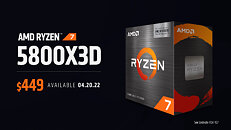
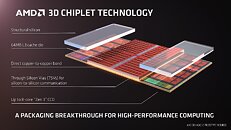
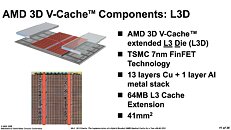
AMD claims that 3DV Cache technology lends "Zen 3" a 15 percent average gaming performance boost over the standard "Zen 3" chiplet; which is akin to a generational performance increase. Performance gains can be over 20 percent in some cases. With this, AMD is claiming that the 5800X3D matches (or even beats) Intel's "Alder Lake" Core i9-12900K processor, which is where the company's "world's fastest gaming processor" claim comes from. The company hasn't had a chance to test the i9-12900KS, as none are available in the market.
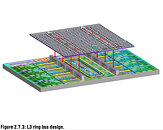
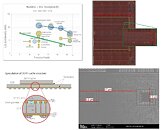
The Ryzen 7 5800X3D in fact has lower clock speeds than the Ryzen 7 5800X. It ticks at 3.40 GHz base, and 4.50 GHz boost, compared to 3.80 GHz base, and 4.70 GHz boost frequency of the 5800X. This is probably because AMD achieved its performance targets for the 5800X3D at its given clocks, and the company wants to stick to the 105 W TDP figure of the 5800X.
The Ryzen 7 5800X3D is built in the same Socket AM4 package as the rest of the Ryzen 5000 desktop processor series, and is drop-in compatible with any AMD 400-series or 500-series chipset motherboard that has AGESA V2 PI 1.2.0.6 (or later). It will also be compatible with AMD 300-series chipset motherboards, with BIOS updates that encapsulate AGESA V2 PI 1.2.0.7.
AMD is pricing the Ryzen 7 5800X3D at USD $449 (MSRP). The processor will be generally available from April 20, 2022. The PIB retail package lacks a stock cooler, but you're spoiled for choice with aftermarket Socket AM4-compatible coolers.
View at TechPowerUp Main Site
64 MB of fast SRAM is stacked on top of the region of the CCD (8-core chiplet) that has 32 MB of on-die L3 cache, with structural silicon leveling the region over the CPU cores with it. This SRAM is tied directly with the bi-directional ring-bus that interconnects the CPU cores, L3 cache, and IFOP (Infinity Fabric Over Package) interconnect. The result is 96 MB of seamless L3 cache, with each of the 8 "Zen 3" CPU cores having equal access to all of it.



AMD claims that 3DV Cache technology lends "Zen 3" a 15 percent average gaming performance boost over the standard "Zen 3" chiplet; which is akin to a generational performance increase. Performance gains can be over 20 percent in some cases. With this, AMD is claiming that the 5800X3D matches (or even beats) Intel's "Alder Lake" Core i9-12900K processor, which is where the company's "world's fastest gaming processor" claim comes from. The company hasn't had a chance to test the i9-12900KS, as none are available in the market.


The Ryzen 7 5800X3D in fact has lower clock speeds than the Ryzen 7 5800X. It ticks at 3.40 GHz base, and 4.50 GHz boost, compared to 3.80 GHz base, and 4.70 GHz boost frequency of the 5800X. This is probably because AMD achieved its performance targets for the 5800X3D at its given clocks, and the company wants to stick to the 105 W TDP figure of the 5800X.
The Ryzen 7 5800X3D is built in the same Socket AM4 package as the rest of the Ryzen 5000 desktop processor series, and is drop-in compatible with any AMD 400-series or 500-series chipset motherboard that has AGESA V2 PI 1.2.0.6 (or later). It will also be compatible with AMD 300-series chipset motherboards, with BIOS updates that encapsulate AGESA V2 PI 1.2.0.7.
AMD is pricing the Ryzen 7 5800X3D at USD $449 (MSRP). The processor will be generally available from April 20, 2022. The PIB retail package lacks a stock cooler, but you're spoiled for choice with aftermarket Socket AM4-compatible coolers.
View at TechPowerUp Main Site










